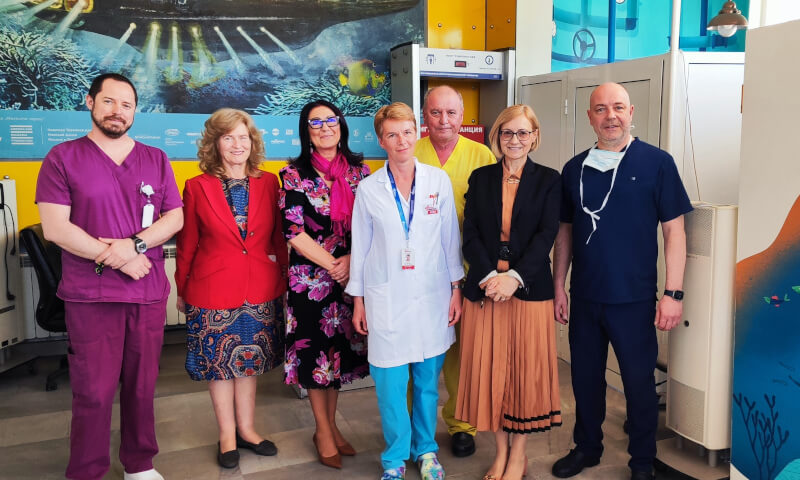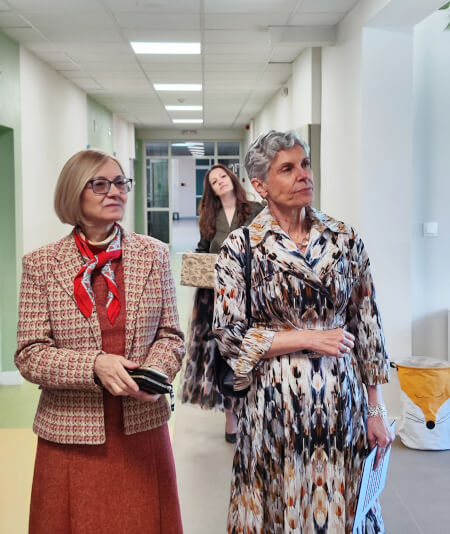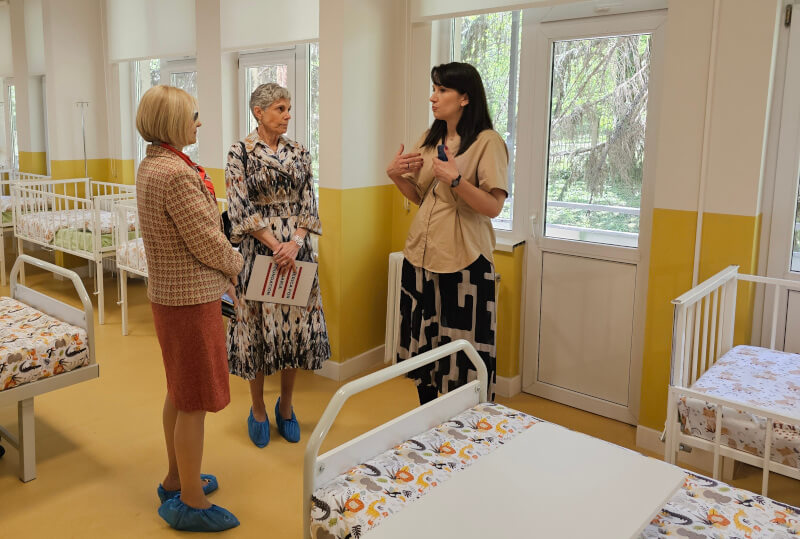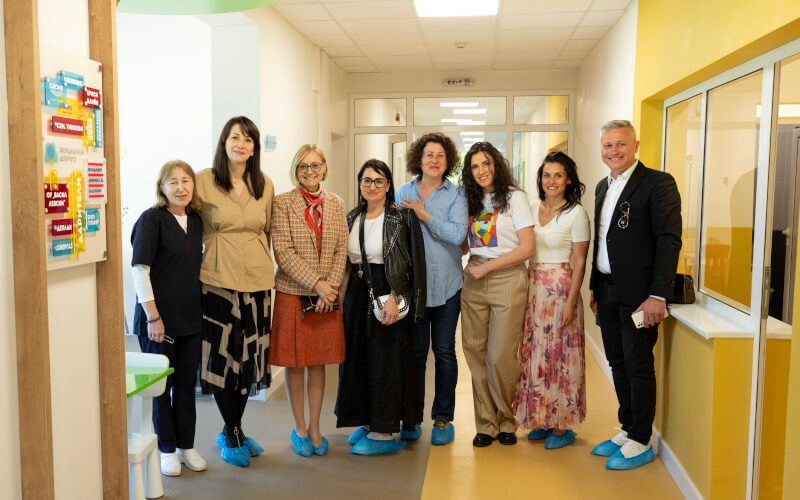
What do you call a person who can tell if your child is ill?
Yes, that’s right. You — the parent.
But if you guessed a pediatrician, you wouldn’t be that far off either.
Modern pediatrics increasingly draws on the experience and expertise of parents to deliver high-quality care. In fact, in countries such as the United States, families are considered an important part of the healthcare team, and their perspectives are taken into account in making care decisions and in designing clinical environments. This trend in medicine toward greater involvement of families and other caregivers is known as family- or relationship-centered care, according to an October 2014 article in the journal Healthcare.
In early April, the America for Bulgaria Foundation hosted Dr. Snezana Nena Osorio, a leading New York City–based pediatrician who helped lead Weill Cornell Medicine’s own transition to family-oriented care in the mid-2000s. Dr. Osorio talked to us about her experience setting up a family partnership program at NewYork-Presbyterian Hospital, a teaching hospital affiliated with Cornell University, an Ivy League school. She stressed the importance of the changes that took place throughout the 2000s and their wide-reaching impact on other branches of medicine within the Weill Cornell system as well.
“[The family-centered approach] makes care smooth and efficient. You get a partner. It’s a mutual benefit for healthcare providers and patients [because] misunderstandings are avoided,” says Dr. Osorio.

Like many physicians trained in the 1980s, Dr. Osorio started her professional life in a completely different environment. In the past, interaction between physicians and families was minimal and confined to basics; the former discussed the patient’s case among themselves, while the latter received a summary of what interventions were administered. Patients and family members were sent off with a list of instructions for follow-up care.
There are obvious shortcomings to this approach, Dr. Osorio explains. Sometimes, healthcare providers might miss important information about their patients simply because they don’t talk to family members enough. This may result in poor outcomes for patients, cause friction between families and physicians, and increase medical staff’s workloads. What is more, limited communication results in inconsistent care after discharge and frustrates family members.
“The best approach to care is partnering [with patients and their families] so that their voices are heard. We are experts in the medical realm, but [parents] are experts in [their] child. That’s what we want to marry so we all benefit from this partnership,” Dr. Osorio says.
In 2003, the American Academy of Pediatrics recognized the importance of family-centered care in pediatrics, providing a definition “based on the understanding that the family is the child’s primary source of strength and support. Further, this approach to care recognizes that the perspectives and information provided by families, children, and young adults are important in clinical decision making.” In 2012, the Academy reaffirmed its commitment to family-centered care and changed its name to patient and family–centered care in recognition of the growing role of children as they mature and take an active part in their own health.

When Dr. Osorio was given stewardship of the family partnership program at Weill Cornell in 2006, she had already had some experience working closely with families because of her time in private practice early in her medical career. Private hospitals already practiced more personalized care and closer family involvement.
“With the right approach, I think [adopting family-centered care] is possible everywhere,” Dr. Osorio says — that is, not just in private care settings. What is necessary for change to happen is institutional commitment and a team that is open to change. “I was lucky my chair [the chair of pediatrics at Weill Cornell, ed.] had the same vision,” Dr. Osorio says. And although some on the hospital team were initially skeptical of the proposed changes — “You want me to do what?” some of her colleagues would ask when the program was first being set up — with the right education and training, they soon saw the benefits of partnering with families.
Even in the best of circumstances, it takes at least five years for behaviors to change, in Dr. Osorio’s judgment.
The main change that Dr. Osorio and her team initiated was in the way physicians rounded. Hospital rounds were no longer a doctors-only affair or took place outside the patient’s room; family members, nurses, social workers, and other hospital staff became part of family-centered rounds, significantly improving communication between healthcare providers and families and leading to better outcomes for patients. “It’s also a more efficient way to round because all the key players are there with you,” Dr. Osorio says.
A vital aspect of family-oriented care is educating families about how best to support their children’s recovery. “We want the family to feel empowered, to understand what’s going on and what to do when they leave the hospital, who to call, etc.,” Dr. Osorio says.

“If the family prefers not to be involved, that’s respected as well. It’s a voluntary process. It’s inviting them to participate,” she adds.
Dr. Osorio and her team also initiated the formation of the Family Advisory Council — a group of dedicated parents whose children have been hospitalized at the NewYork-Presbyterian Hospital. The group’s work is voluntary and ranges from helping to improve the hospital environment and patient resources to providing orientation and support for medical residents and parents of newly admitted patients.
The Council members’ dedication and often long-term involvement are a testament to the value of the family partnership approach in care. An improved parents’ guide and a more accessible and comfortable shared space for families are some of the Family Advisory Council’s early achievements. One of the first Council members was a lawyer who helped write the Council’s by-laws. A more recent addition to the team is the mother of an autistic child who prepared a manual for hospital staff for dealing with autistic patients; she also regularly assists with editing hospital communications. A grieving couple made recordings for fellow parents because “they felt their voices were heard,” Dr. Osorio explains. All Council members want to give back the support they received.
Perhaps the most lasting contribution of the Family Advisory Council is the formation of the Family Faculty. This group of parents participates in the education of undergraduate and graduate medical students and nurses. “First-year pediatric residents’ favorite part of orientation is meeting the family advisors,” Dr. Osorio says.
Last but not least, various studies suggest that family-centered medical practice improves patient satisfaction with the care they receive.
For her work to engage families in care delivery and improve pediatric care, Dr. Osorio received the first Clinical Scholar Award for Patient Safety and Quality from Weill Cornell’s Department of Pediatrics and the Physician of the Year Award, both in 2007.
In addition to being a sought-after pediatrician, Dr. Osorio is an award-winning educator, author of numerous peer-reviewed publications and book chapters, and reviewer. She is also a frequent contributor to leading conferences on pediatric research and child advocacy in the United States, such as the Pediatric Academic Societies Meeting and Pediatric Hospital Medicine Meeting. Dr. Osorio’s current research focuses on quality improvement and medication safety.
She successfully juggles her responsibilities as attending physician at NewYork-Presbyterian Hospital/Weill Cornell Medical Center and the NYP Komansky Children’s Hospital and her work as vice chair for quality and patient safety and professor of clinical pediatrics in the Department of Pediatrics, Weill Cornell Medicine.
Dr. Osorio received her medical degree from the University of Belgrade School of Medicine in 1985 and a master of science degree in translational and clinical research from Weill Cornell Medical College in 2011.

